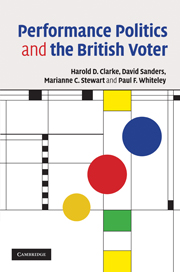Book contents
- Frontmatter
- Contents
- List of figures
- List of tables
- Acknowledgments
- 1 Performance politics and the British voter
- 2 The theory of valence politics
- 3 Valence politics and the long campaign
- 4 Tony's war
- 5 Electoral choices
- 6 The short campaign
- 7 Voting and political participation
- 8 Performance, people and the political system
- 9 Performance politics reconsidered
- Appendix A Vote in 2005 by socio-demographic characteristics
- Appendix B Turnout by socio-demographic characteristics
- Appendix C Dynamics of party identification
- Notes
- Bibliography
- Index
7 - Voting and political participation
Published online by Cambridge University Press: 06 January 2010
- Frontmatter
- Contents
- List of figures
- List of tables
- Acknowledgments
- 1 Performance politics and the British voter
- 2 The theory of valence politics
- 3 Valence politics and the long campaign
- 4 Tony's war
- 5 Electoral choices
- 6 The short campaign
- 7 Voting and political participation
- 8 Performance, people and the political system
- 9 Performance politics reconsidered
- Appendix A Vote in 2005 by socio-demographic characteristics
- Appendix B Turnout by socio-demographic characteristics
- Appendix C Dynamics of party identification
- Notes
- Bibliography
- Index
Summary
Britain's first fully peacetime, post–Second World War general election was held on 23 February 1950. In that contest, 84% of the eligible electorate went to the polls — a highpoint in voter turnout that has not been revisited. In twenty–first–century general elections, turnout has been dismal, with only 61.2% voting in 2005 and only 59.4 doing so in 2001. These numbers are the end–points — thus far — in a long–term decline in electoral participation in Britain. The downward trend has accelerated over the past decade, and the percentages of people taking part in the two most recent general elections are lower than at any time since 1918. This raises an important question: is the decline in turnout unique or a reflection of a more general decrease in political participation?
If voting is affected, but not other forms of involvement such as party activity, boycotting goods and services for political reasons, and protesting, then it suggests that in an increasingly complex and interconnected world citizens are finding other ways of trying to influence the political process. Although the long–term consequences of this development for British democracy will not be wholly salutatory, since making choices among governing and opposition parties traditionally has been the principal way by which the vast majority of people make their voices heard, the overall effect is unlikely to be fatal to democratic governance. Within broad limits, the percentage of people voting may not matter greatly when large numbers of citizens are availing themselves of other means of exerting political influence.
- Type
- Chapter
- Information
- Performance Politics and the British Voter , pp. 231 - 271Publisher: Cambridge University PressPrint publication year: 2009



